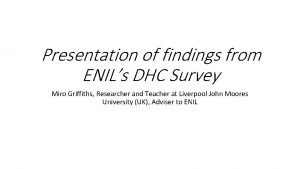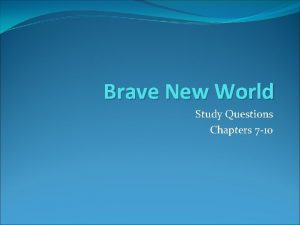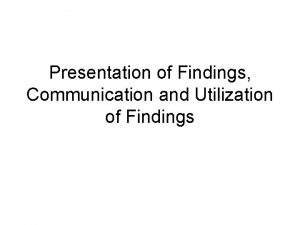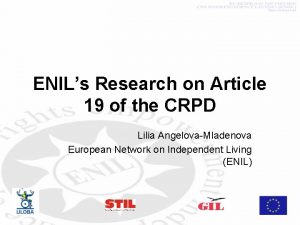Presentation of findings from ENILs DHC Survey Miro









- Slides: 9

Presentation of findings from ENIL’s DHC Survey Miro Griffiths, Researcher and Teacher at Liverpool John Moores University (UK), Adviser to ENIL

Background • Combatting disability hate crime (DHC) is vital for Independent Living as it is a barrier for disabled people in accessing their rights to lives with full participation. • ENIL has been active in the area of DHC through different partnerships since 2011 – toolkit, OSCE events, DPO-Law Engagement partnerships. • ENIL contacted a diverse range of stakeholders to contribute by participating in the survey. The goal was to describe the work that has been done thus far to combat disability hate crime and identify good examples that can be disseminated to advance the work in the field.

Methodology • Stakeholders were also asked for their advice on furthering the aims and strategies of those who seek to address disability hate crime with the intention that this would lead to new organisations and individuals joining a network for positive change. • The survey consisted of four questions, which was distributed through email and respondents were asked to reply directly to the sender. • The survey was disseminated through various civil society organisations, non-governmental organisations, government departments of various member states and influential members within the Disabled People’s Movement. (9 responses, 8 analysed)

Questions • Describe your work on hate crime? (Prompts: Consider for example telling who is involved in the work. Has the work contributed to policy development? Is there support for individuals and communities experiencing hate crime? What actors are contributing? Is hate crime being considered in a broader perspective in your country? ) • What would you need to advance your work? (Prompts: Describe what is needed be it funding, or the establishment of links or a larger network, the receiving of additional guidance and support, or better access to decision makers and policy developers. ) • What good examples do you know of that should be spread? (Prompts: Is your government mapping hate crime across the government? How is the government creating dialogue with the community? Are the law forces working with hate crime and how? Why do you think these examples are good? Where would you see the information being disseminated? ) • What advice would you give to others in order to advance the work in the field of disability hate crime? (Prompts: What works in advancing this issue? Who is talking to who in the area of DHC? What convinces people to do things? Where would you want this advice to go? Highlight any barriers you know of to the advancement in the combat of hate crime? How would you articulate the importance of spreading information on hate crime? )

Early Analysis – Describe your work on hate crime? Theme Number of Sources Number of References Advocating for implementation of existing laws 5 5 Provision of continuous support to people experiencing disability hate crime 1 2 Facilitating dialogue between organisations committed or interested in disability hate crime 3 3 Raising awareness to disabled people and/or law enforcement Signposting individuals and/or organisations to further information on disability hate crime 5 12 1 1 Third Party Reporting mechanism 1 1

Early Analysis – What would you need to advance your work? Theme Number of Sources Number of References Additional funding Consistent approach from law enforcement and prosecution Establishing national network of user-led trainers in disability hate crime Raising awareness of disability hate crime 5 4 5 6 2 2 5 7

Early Analysis – What good examples do you know of that should be spread? Number of Theme Sources Awareness of established organisations and 4 networks Promotion of existing general material of disability 3 hate crime Promotion of existing Third Party Reporting 1 mechanisms Literature on understanding what is disability hate 1 crime Literature to explain the reasons for not reporting 2 disability hate crime Number of References 4 8 3 2 2

Early Analysis – What advice would you give to others in order to advance the work in the field of disability hate crime? Theme Number of Sources Number of References Importance of collaboration Significance of personal stories and user involvement in policies and strategies to tackle disability hate crime 4 4 Knowledge of legislative frameworks Awareness of specific concepts to understand disability hate crime Targeted campaigns 2 3 3 7 2 3

Let’s Keep Talking… Miro Griffiths • Email: m. griffiths 2@ljmu. ac. uk • Twitter: @mirogriffiths • Mobile: 07835 413 238 • https: //ljmu. academia. edu/Miro. Griffiths
















